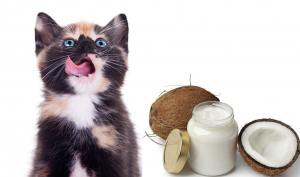Can Cats Eat Coconut
Coconuts would not benefit your cat’s overall health much, however, if he is curious enough to take a lick of the shredded coconut, pie or cream that you are eating, take the liberty of offering it a tiny morsel, as small amounts of coconut given seldom would be fine.
Cats and coconut: Can all forms of it be eaten
Coconut meat or flesh – This should be given in moderation as the fat content or MCT (medium chain triglycerides) present in it is not healthy for the cat, resulting in hepatitis lipidosis when given in excess amounts.
Coconut water – It is better to avoid since it is high in potassium and sugar, being harmful to your feline’s health.
Coconut milk – Though it is not a dairy product, its usage for cats should still be limited as it is high in calories and your kitty may also find it difficult to digest it.
Coconut oil – Small amounts of coconut oil added to your cat’s diet is said to be an adequate remedy for those having hairball problem. It may also be applied topically to cats with skin ailments like allergies, inflammation or itchiness. However, take caution as ASPCA has highlighted of coconut oil leading to diarrhea and stomach aches in cats.
Coconut flour – It is safe to be used as an ingredient while making homemade treats though in a reduced amount.
Coconut rice- Though rice in a measured quantity is right for your feline’s digestive system, avoid giving coconut rice, as apart from the main ingredients it also includes salt and other additives that may hurt its stomach.
Coconut yogurt – This too contains a lot of artificial sweeteners apart and hence is not recommended.
Apart from these, coconut based products like chips, cream and ice-cream should also be given in reduced quantities considering the calories, salt, sugar, and additives present in them.
If you cat reacts abnormally or has allergic symptoms after eating coconut, contact your veterinarian at once.

